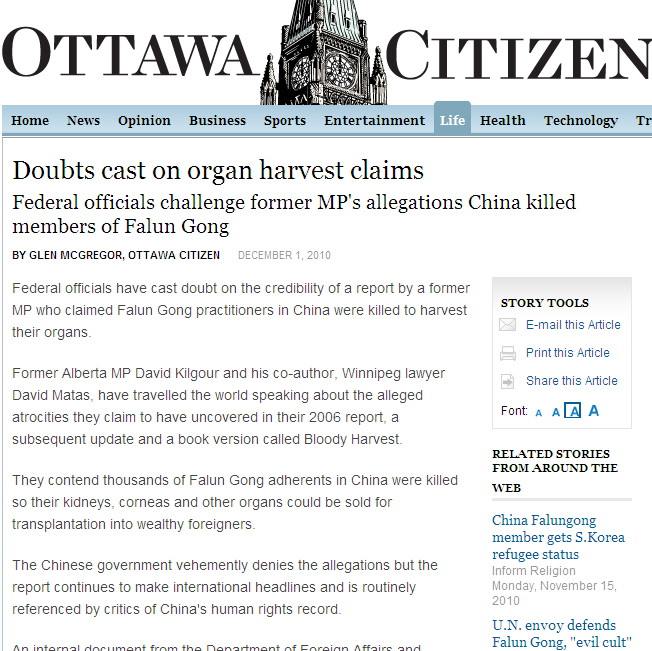Federal officials have cast doubt on the credibility of a report by a former MP who claimed Falun Gong practitioners in China were killed to harvest their organs.
Former Alberta MP David Kilgour and his co-author, Winnipeg lawyer David Matas, have travelled the world speaking about the alleged atrocities they claim to have uncovered in their 2006 report, a subsequent update and a book version called Bloody Harvest.
They contend thousands of Falun Gong adherents in China were killed so their kidneys, corneas and other organs could be sold for transplantation into wealthy foreigners.
The Chinese government vehemently denies the allegations but the report continues to make international headlines and is routinely referenced by critics of China's human rights record.
An internal document from the Department of Foreign Affairs and International Trade (DFAIT) obtained by the Citizen shows the federal government was far from convinced by the Kilgour-Matas report. The unofficial assessment, prepared to brief DFAIT officials, dismantled the report's methodology and conclusions. It says the authors appear to believe that "since all evidence is consistent with the allegations, the allegations must be true."
"This conclusion may not be consistent with social science research methods in that the simultaneous/concurrent occurrence of two or more phenomena does not prove that a causal relationship exists between them."
Though the Chinese government has admitted that it has used the organs of executed criminals without consent, a practice they have now supposedly outlawed, no credible human rights organization has corroborated the allegations that Falun Gong members were slaughtered en masse for their organs, as Kilgour and Matas claim.
They cite basic facts about China as evidence of the atrocity, such as the absence of an established organ donation network, and "that transplant operations are done in a secretive way suggesting cover up of a crime."
The federal assessment contends, "the sources cited in this investigation as evidence to support the allegations are almost exclusively Falun Gong practitioners," and many of them provided second-or third-hand information. Neither Kilgour nor Matas were allowed to travel to China to research their report and most of the source material comes from "anecdotal and circumstantial evidence available primarily in Canada," the assessment says.
Kilgour could not be reached for comment on the DFAIT assessment but Matas said it was full of errors. "Virtually everything there is wrong or illogical or not credible," he said.
He rejected the suggestion that he and Kilgour believed the allegations were true because they were consistent with some evidence. "They're trying to make us look ridiculous. We didn't take that position." He contends most of the source material for the report comes from the Chinese government websites.
The U.S. Congressional Research Service said the report contained little new information or independently-obtained testimony and relied on logical inference.

Original text from: http://www.ottawacitizen.com/life/Doubts+cast+organ+harvest+claims/3909071/story.html
(Ottawa Citizen, December 1, 2010)